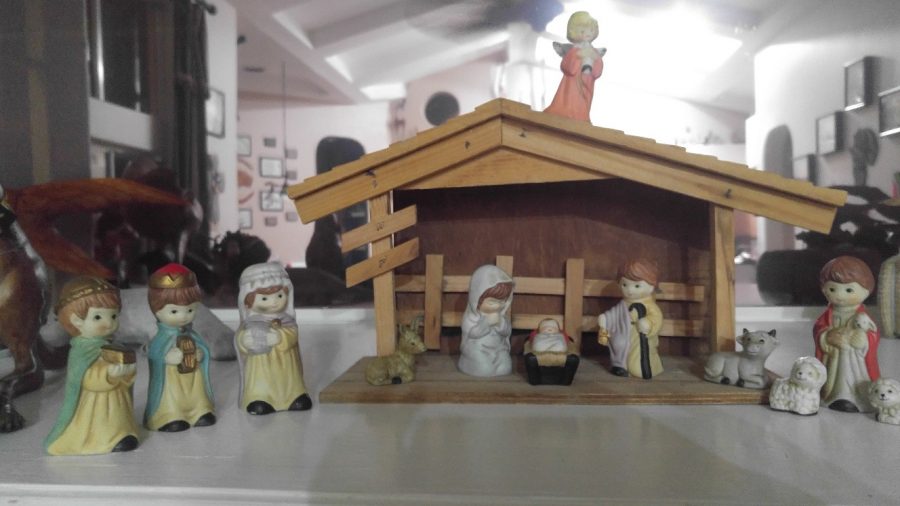Christmas not just for Christians
Cities across the United States are dotted with wreaths, dazzled with colorful lights and drowned in red and green. Christmas songs are on everywhere, all the time, and the cooler weather is combated by the warm hearts of strangers who seem to be just a little bit more generous for the Christmas season. Christmas no longer is a private holiday, spent in churches and homes. Christmas surrounds us all, and has become far more than it used to be in a lot of ways.
Originally, Christmas was a religious holiday, a time when Christians came together to celebrate the birth of Jesus. But as time passed, Christmas picked up bits and pieces from countless cultures and religions, spiraling into one huge holiday that entertains a nation for an entire season. Different families adopt different traditions to form a holiday that means something special for them, and whether that meaning is religious or not, it needs to be accepted. Almost none of the Christmas traditions celebrated worldwide have an origin in the Christian religion, and excluding other religious groups from participating wouldn’t be fair. The different Christmas traditions can be profoundly meaningful to some, and nothing but a bit of fun for others, and there is no reason for that to be challenged. Christmas is a complex holiday and Christians cannot lay an exclusive claim to the festivities.
Christmas is widely perceived as a Christian holiday, and the prevalence of Christmas decorations may seem to overshadow other religions. However, the famous Christmas decorations that cover the country are rarely Christian in origin. Wreaths were used by Greeks and Romans to symbolize their sun god Apollo, mistletoe was a sacred plant to the Druids, who used it to restore fertility, and lights were used by Pagans to celebrate the return of the light after the winter solstice. Even the Christmas tree is a mix of several different cultures that believed evergreens symbolized immortality and fortitude. Add in some distinctly non-religious decorations, like snowmen and candy canes, and you’ll have nearly every Christmas decoration other than the nativities, which are perhaps the only Christian decoration of the season. Anyone, regardless of religion, should have the right to hang beautiful and unique Christmas decorations around their home, and their popularity is an attempt by Christians to force religion into other’s faces, not an attempt by non-Christians to steal a holiday. These decorations, regardless of origin or reason, are beautiful additions to an otherwise bleak season.
Of course, there’s always the underlying meaning of the holiday. The warm family atmosphere, the joy of giving gifts and the good feelings that hang in the air—certainly those are Christian, right? In some ways, the values of Christmas are Christian—they line up well with Christian beliefs and ideas—but none of them are exclusively so. An atheist can love their family as much as anyone else, and there’s nothing stopping a Muslim from being extra kind to strangers during the Christmas season. Even the tradition of gift-giving comes from a New Year tradition to foster good feelings at the end of the year. Christmas values are simply human values that are given extra recognition during the season, and are far from exclusive to the religion. Containing these emotions to one religion would be just as impossible as containing them to one time of year, and trying to do either would be foolish. For many, Christmas is a time of joy, and we need to allow them that joy, regardless of its cause.
The festivities of the season are not exclusively Christian, nor did they originate as if they were. The idea of a celebration at this time of year originated from the festival of Saturnalia, a Roman festival celebrating their god of agriculture, Saturn, that featured many of the same traditions and values of Christmas and was celebrated Dec. 17-23. Later, other religious groups celebrated the winter solstice, which changes exact days annually, but always occurs near Christmas. Even once the holiday became a celebration of the birth of Jesus, the church rejected it for many years. Christmas may be an extremely meaningful day for the religion, but its origins of festivity were just as borrowed as its most popular traditions. People from other religions should have the right to borrow from the Christian celebration to form their own traditions and celebrations, just as Christians did with Saturnalia.
All of this being said, the holiday still means a lot for Christians. Origins aside, Christmas is a time of celebration, and everything that comes with it. They have a right to celebrate this holiday, a symbol of what is likely the most important even in the history of their religion. For Christians, Christmas is profound and beautiful, far more so than it could ever be for a non-Christian. Every tradition takes on a new meaning in a Christian household, and there’s no reason to argue against that. For Christians, the holiday is a lot more than the traditions that others use to define it. Not allowing Christians to have their ever important holiday would be just as bad, if not worse, than excluding people of other religions from the festivities.
Christmas means different things to different people, and we need to accept, or at least tolerate that. Not everyone needs to see the brightly colored lights and think of the birth of Jesus, but they also don’t need to be thinking of the return of the light after the winter solstice. With 92 percent of Americans celebrating, Christmas is an extremely popular holiday, and its origins are as diverse as the people who celebrate it. To some, every tradition means something, and to others, they are nothing but a fun and festive way to celebrate the season. We need to accept these people and what the holiday means to them, without trying to superimpose our own beliefs onto them.
Your donation will support the student journalists of Hagerty High School. Your contribution helps us publish six issues of the BluePrint and cover our annual website hosting costs. Thank you so much!


![Its The Little Things: [CENSORED]](https://hhsblueprint.com/wp-content/uploads/2024/04/IMG_4644-600x384.jpeg)




